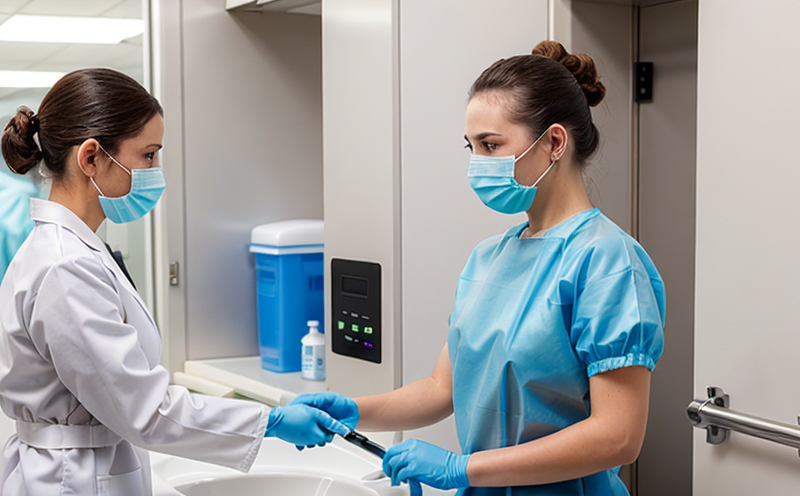GB T 24253 Antiviral activity testing of textiles
The GB/T 24253 standard specifies a method for determining the antiviral efficacy of textiles, which is crucial in ensuring that fabrics used in medical, personal protective equipment (PPE), and other hygiene products effectively inhibit viral replication. This service focuses on providing comprehensive support to clients who need to comply with this testing protocol, thereby enhancing product safety and effectiveness.
The standard involves a series of rigorous steps aimed at evaluating the antiviral activity of textiles through a standardized process. It is essential for manufacturers and suppliers to ensure that their products meet stringent requirements set by regulatory bodies. By offering this service, Eurolab ensures that clients receive accurate and reliable results, which are critical for maintaining trust with end-users.
The testing procedure typically includes the following steps: preparation of test samples according to specified guidelines; inoculation of a known quantity of virus onto these samples; incubation under controlled conditions over a defined period; followed by assessment of residual viral load using appropriate detection methods. Results are then compared against control samples not treated with any antimicrobial agents.
Our team of experts ensures that every step adheres strictly to the requirements outlined in GB/T 24253, guaranteeing accurate and consistent results across all tests conducted. This level of precision is vital given the importance placed on antiviral properties within healthcare settings where even minor deviations could have significant implications.
Compliance with such standards not only protects consumers but also provides manufacturers with a competitive edge by demonstrating their commitment to quality and safety. Additionally, successful completion of these tests can lead to increased market share as more organizations turn towards eco-friendly solutions that incorporate advanced antimicrobial technologies into their products.
In summary, our GB/T 24253 service offers clients peace of mind knowing they are meeting industry benchmarks while also positioning themselves favorably in a rapidly evolving marketplace. With detailed insights from experienced professionals and state-of-the-art facilities at your disposal, you can rest assured that your compliance efforts will be both effective and efficient.
Scope and Methodology
The scope of the GB/T 24253 standard encompasses various aspects related to determining antiviral activity in textiles. This includes defining what constitutes an appropriate sample size, specifying conditions for incubation periods, outlining acceptable methods for measuring residual viral loads, and establishing criteria for interpreting results.
- Sample preparation: Samples must be prepared according to specified dimensions and weights
- Inoculation process: A set amount of virus is introduced onto the fabric
- Incubation time: Specified duration during which the sample remains exposed to the viral inoculum
- Measurement techniques: Various approaches are allowed, including quantitative PCR or plaque assays
The methodology described in GB/T 24253 ensures that all tests conducted follow a standardized procedure. This consistency is key for generating comparable data across different laboratories and over time.
Eurolab Advantages
At Eurolab, we pride ourselves on offering unparalleled expertise in textile testing services, particularly when it comes to complying with GB/T 24253 standards. Our team comprises highly skilled professionals who possess extensive knowledge and experience in this field.
- Comprehensive understanding: Our experts have a deep grasp of the nuances involved in interpreting results according to GB/T 24253
- State-of-the-art equipment: We utilize cutting-edge technology that guarantees accurate and precise measurements
- Dedicated support: Clients benefit from personalized assistance throughout the entire testing process, ensuring no stone is left unturned
- Timely delivery: Results are provided promptly so you can act upon them quickly without delay
These advantages position Eurolab as your go-to partner for all matters concerning textile testing and certification. Rest assured that we will deliver top-notch services every time.
Competitive Advantage and Market Impact
- Better product differentiation: Compliance with GB/T 24253 can help differentiate your products in competitive markets, as consumers increasingly seek out hygienic textiles.
- Increased customer trust: Meeting these stringent standards builds confidence among buyers who value safety and quality above all else.
- Potential for innovation: Understanding how various factors influence antiviral activity allows companies to innovate within their product lines.
- Regulatory compliance: Ensuring strict adherence to industry norms helps avoid costly legal issues down the line.
These benefits translate directly into enhanced brand reputation and increased market share, making GB/T 24253 certification particularly valuable for businesses operating in sectors where hygiene is paramount.





